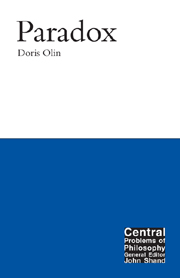
-
The digital format of this book is no longer available to purchase from Cambridge Core. Other formats may be available.
-
Select format
-
- Publisher:
- Acumen Publishing
- Publication date:
- 05 February 2013
- 30 June 2002
- ISBN:
- 9781844653508
- 9781902683812
- 9781902683829
- Dimensions:
- Weight & Pages:
- 00kg,
- Dimensions:
- Weight & Pages:
- 00kg,
- Subjects:
- Twentieth-Century Philosophy, Philosophy
- Series:
- Central Problems of Philosophy
You may already have access via personal or institutional login- Subjects:
- Twentieth-Century Philosophy, Philosophy
- Series:
- Central Problems of Philosophy
Book description
Paradoxes are more than just intellectual puzzles they raise substantive philosophical issues and offer the promise of increased philosophical knowledge. In this introduction to paradox and paradoxes, Doris Olin shows how seductive paradoxes can be, why they confuse and confound, and why they continue to fascinate. Olin examines the nature of paradox, outlining a rigorous definition and providing a clear and incisive statement of what does and does not count as a resolution of a paradox. The view that a statement can be both true and false, that contradictions can be true, is seen to provide a challenge to the account of paradox resolution, and is explored. With this framework in place, the book then turns to an in-depth treatment of the Prediction Paradox, versions of the Preface/Fallibility Paradox, the Lottery Paradox, Newcomb's Problem, the Prisoner's Dilemma and the Sorites Paradox. Each of these paradoxes is shown to have considerable philosophical punch. Olin unpacks the central arguments in a clear and systematic fashion, offers original analyses and solutions, and exposes further unsettling implications for some of our most deep-seated principles and convictions.
Reviews
"A valuable book by a substantial contributor to the philosophical literature on paradoxes. The outlines of problems combine accuracy with clarity and manage to cover technical background material with impressive economy and simplicity. It offers fair summaries of opposing views, along with cogent criticism and sharp, penetrating analysis."
James Cargile
Contents
Metrics
Full text views
Full text views help Loading metrics...
Loading metrics...
* Views captured on Cambridge Core between #date#. This data will be updated every 24 hours.
Usage data cannot currently be displayed.
Accessibility standard: Unknown
Why this information is here
This section outlines the accessibility features of this content - including support for screen readers, full keyboard navigation and high-contrast display options. This may not be relevant for you.
Accessibility Information
Accessibility compliance for the PDF of this book is currently unknown and may be updated in the future.


